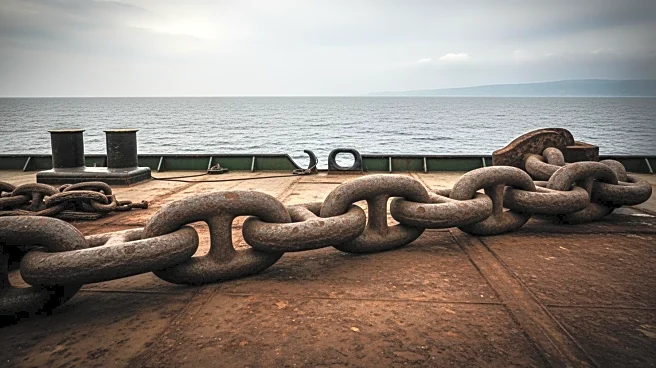What's Happening?
Iran's Islamic Revolutionary Guard Corps (IRGC) has seized the Marshall Island-flagged oil tanker MV Talara in the Gulf of Oman. The tanker, weighing 73,000 dwt, was intercepted 22 miles off the coast of Khor Fakkan in the United Arab Emirates and moved
into Iranian waters. The IRGC claims the seizure is part of efforts to protect Iranian resources, hinting at a possible anti-smuggling operation. The tanker is owned by Pasha Finance Inc., a California-based company, and managed by Columbia Ship Management, a Cyprus-registered firm. The IRGC's actions may also be linked to a previous incident involving the tanker Falcon, which was abandoned after an explosion while carrying LPG to a Houthi-controlled port.
Why It's Important?
The seizure of the MV Talara highlights ongoing tensions in the Gulf region, particularly concerning oil smuggling and maritime security. This incident could exacerbate geopolitical tensions, especially if perceived as a retaliatory move by Iran against perceived aggressors. The IRGC's actions may impact international shipping routes and oil markets, potentially leading to increased insurance costs and heightened security measures for vessels operating in the region. The situation underscores the fragile state of Iran's internal politics, with hardliners within the IRGC continuing to exert influence despite the regime's apparent vulnerabilities.
What's Next?
The international community, particularly countries with vested interests in Gulf shipping lanes, may respond with diplomatic pressure or increased naval presence to ensure maritime security. The IRGC's actions could prompt discussions within Iran's ruling elite about the balance of power and the country's foreign policy direction. The release of the Talara's crew and cargo remains uncertain, and further escalations could occur if the situation is not resolved diplomatically.
Beyond the Headlines
The incident reflects broader issues of resource control and political power within Iran. The IRGC's ability to conduct such operations indicates their significant influence, which may complicate efforts for diplomatic engagement with Iran. The seizure also raises questions about the effectiveness of international maritime law in protecting commercial shipping interests in politically volatile regions.















